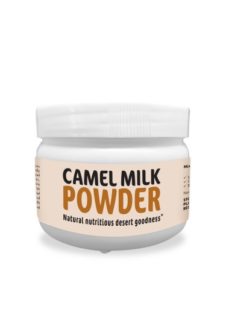We know, we know. There are already so many versions of milk available on your grocery shelves. But wait until you hear about desert milk. With a superior nutrient profile and a non-allergenic profile, it also presents an ethical replacement for conventionally farmed milk.
Human Milk and Desert Milk
After human milk, this milk most closely meets our nutritional requirements. It also has numerous health-enhancing benefits that far outstrip dairy and its more common alternatives. Currently, an estimated 5% of the world’s population is allergic to cow’s milk. Many more people are showing reactivity to sheep and goat’s milk and even plant-based nut milks.
While it may be new to you, it’s certainly not new to North Africa, the Middle East, and parts of Asia. In nomadic and Bedouin cultures, camel milk has been a staple for hundreds of years. Now, it is rapidly gaining popularity in Germany and the Netherlands. Today, you can find it in most supermarkets in Saudi Arabia, the United Arab Emirates, Kenya, Dubai, Australia, and the USA.
Powerful nutrients & antioxidants
Desert milk, or Camel milk as it is also known, is free from Beta-lactoglobulin, the main allergen in cow’s milk. It has more vitamin C, B6, Iron, Calcium, Magnesium, and Potassium than cow’s milk with far greater protein content. It also has low milk sugar lactose. Along with superior fat content, the natural antibiotics in camel milk keep the milk fresher for a longer period.
Desert Milk Easier To Digest?
Desert milk is also much easier to digest. This is because it contains A2 casein. The human body can break down much more easily than the difficult-to-digest A1 casein protein. Many of the health advantages are due to the immunoglobulins present in camel’s milk. This contributes to strengthening and building immune health.
Therapeutic benefits
Lactoferrin is the main ingredient in desert milk. It prevents microbial growth in the gut, lowering inflammation and supporting immune health.

Considerable research is revealing the medical benefits of regular desert milk consumption. These are just some of the most important benefits of desert milk.
- To manage diabetes;
- Improve the immune system;
- Anti-cancer action of camel milk. The claimed anti-cancer action of camel products is widely accepted by local healers. They use a mixture of camel milk and urine in the treatment of patients suffering from a variety of cancers, including breast, nasopharyngeal, lung, and others.
- Stimulate circulation;
- Assist in the treatment of autism;
- Reduce food allergies;
- Promote growth and development;
- Protect against certain autoimmune diseases; and
- Boost heart health
- Wound healing: Relevant to the immune properties of camel milk, camel whey protein was shown to be effective in enhancing wound healing in the diabetic mouse model by mobilizing a wide range of cellular immune responses as well as cytokines.
What Does Desert Milk Taste Like?
The taste of this desert milk is lightly sweet, rich, and creamy. It’s very comparable to cow’s milk. However, unlike cows, which are fed fodder and routinely treated with antibiotics and growth hormones, these camels have naturally robust immune systems.
This keeps them healthy, requiring no veterinary interventions. Nor are the calves separated from their mothers at birth; baby camels stay with their mothers for the first month and then spend time with them twice daily at milking times.
You can buy it fresh or in powder form. Always check if the supplier confirms to international production processes.
The Bottom Line
Given the many scientifically-proven benefits of desert milk, if you want a healthier, non-dairy option, then it should be on your 2020 grocery list.
Want to know more?
Enjoyed this? Then read about the ten principles that will help you lose weight in 2020.
References
1. Int J Health Sci (Qassim). 2017 Nov-Dec; 11(5): 1–2. Medicinal values of bioactive constituents of camel milk: A concise report
2. Medicinal values of bioactive constituents of camel milk: A concise report
3. Journal of Taibah University Medical Sciences
Review Article The unique medicinal properties of camel products: A review of the scientific evidence.
Sciences de la santé – Affiches // Health Sciences – Research Posters



![women [longevity live]](https://longevitylive.com/wp-content/uploads/2020/01/photo-of-women-walking-down-the-street-1116984-100x100.jpg)










